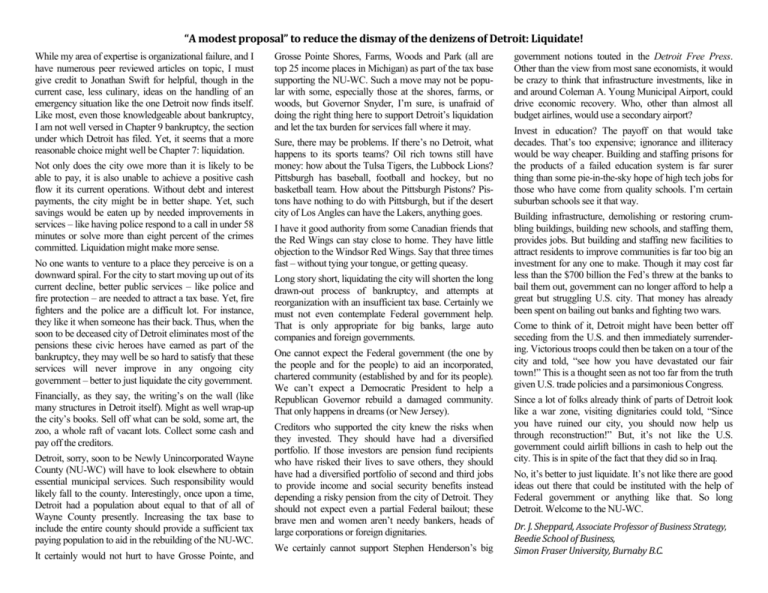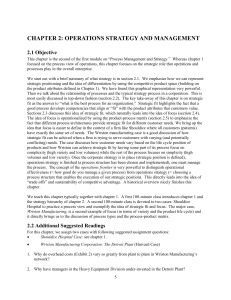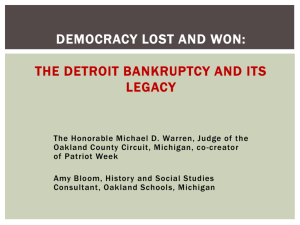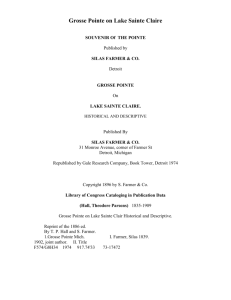“A modest proposal” to reduce the dismay of the denizens of Detroit
advertisement

“A modest proposal” to reduce the dismay of the denizens of Detroit: Liquidate! While my area of expertise is organizational failure, and I have numerous peer reviewed articles on topic, I must give credit to Jonathan Swift for helpful, though in the current case, less culinary, ideas on the handling of an emergency situation like the one Detroit now finds itself. Like most, even those knowledgeable about bankruptcy, I am not well versed in Chapter 9 bankruptcy, the section under which Detroit has filed. Yet, it seems that a more reasonable choice might well be Chapter 7: liquidation. Not only does the city owe more than it is likely to be able to pay, it is also unable to achieve a positive cash flow it its current operations. Without debt and interest payments, the city might be in better shape. Yet, such savings would be eaten up by needed improvements in services – like having police respond to a call in under 58 minutes or solve more than eight percent of the crimes committed. Liquidation might make more sense. No one wants to venture to a place they perceive is on a downward spiral. For the city to start moving up out of its current decline, better public services – like police and fire protection – are needed to attract a tax base. Yet, fire fighters and the police are a difficult lot. For instance, they like it when someone has their back. Thus, when the soon to be deceased city of Detroit eliminates most of the pensions these civic heroes have earned as part of the bankruptcy, they may well be so hard to satisfy that these services will never improve in any ongoing city government – better to just liquidate the city government. Financially, as they say, the writing’s on the wall (like many structures in Detroit itself). Might as well wrap-up the city’s books. Sell off what can be sold, some art, the zoo, a whole raft of vacant lots. Collect some cash and pay off the creditors. Detroit, sorry, soon to be Newly Unincorporated Wayne County (NU-WC) will have to look elsewhere to obtain essential municipal services. Such responsibility would likely fall to the county. Interestingly, once upon a time, Detroit had a population about equal to that of all of Wayne County presently. Increasing the tax base to include the entire county should provide a sufficient tax paying population to aid in the rebuilding of the NU-WC. It certainly would not hurt to have Grosse Pointe, and Grosse Pointe Shores, Farms, Woods and Park (all are top 25 income places in Michigan) as part of the tax base supporting the NU-WC. Such a move may not be popular with some, especially those at the shores, farms, or woods, but Governor Snyder, I’m sure, is unafraid of doing the right thing here to support Detroit’s liquidation and let the tax burden for services fall where it may. Sure, there may be problems. If there’s no Detroit, what happens to its sports teams? Oil rich towns still have money: how about the Tulsa Tigers, the Lubbock Lions? Pittsburgh has baseball, football and hockey, but no basketball team. How about the Pittsburgh Pistons? Pistons have nothing to do with Pittsburgh, but if the desert city of Los Angles can have the Lakers, anything goes. I have it good authority from some Canadian friends that the Red Wings can stay close to home. They have little objection to the Windsor Red Wings. Say that three times fast – without tying your tongue, or getting queasy. Long story short, liquidating the city will shorten the long drawn-out process of bankruptcy, and attempts at reorganization with an insufficient tax base. Certainly we must not even contemplate Federal government help. That is only appropriate for big banks, large auto companies and foreign governments. One cannot expect the Federal government (the one by the people and for the people) to aid an incorporated, chartered community (established by and for its people). We can’t expect a Democratic President to help a Republican Governor rebuild a damaged community. That only happens in dreams (or New Jersey). Creditors who supported the city knew the risks when they invested. They should have had a diversified portfolio. If those investors are pension fund recipients who have risked their lives to save others, they should have had a diversified portfolio of second and third jobs to provide income and social security benefits instead depending a risky pension from the city of Detroit. They should not expect even a partial Federal bailout; these brave men and women aren’t needy bankers, heads of large corporations or foreign dignitaries. We certainly cannot support Stephen Henderson’s big government notions touted in the Detroit Free Press. Other than the view from most sane economists, it would be crazy to think that infrastructure investments, like in and around Coleman A. Young Municipal Airport, could drive economic recovery. Who, other than almost all budget airlines, would use a secondary airport? Invest in education? The payoff on that would take decades. That’s too expensive; ignorance and illiteracy would be way cheaper. Building and staffing prisons for the products of a failed education system is far surer thing than some pie-in-the-sky hope of high tech jobs for those who have come from quality schools. I’m certain suburban schools see it that way. Building infrastructure, demolishing or restoring crumbling buildings, building new schools, and staffing them, provides jobs. But building and staffing new facilities to attract residents to improve communities is far too big an investment for any one to make. Though it may cost far less than the $700 billion the Fed’s threw at the banks to bail them out, government can no longer afford to help a great but struggling U.S. city. That money has already been spent on bailing out banks and fighting two wars. Come to think of it, Detroit might have been better off seceding from the U.S. and then immediately surrendering. Victorious troops could then be taken on a tour of the city and told, “see how you have devastated our fair town!” This is a thought seen as not too far from the truth given U.S. trade policies and a parsimonious Congress. Since a lot of folks already think of parts of Detroit look like a war zone, visiting dignitaries could told, “Since you have ruined our city, you should now help us through reconstruction!” But, it’s not like the U.S. government could airlift billions in cash to help out the city. This is in spite of the fact that they did so in Iraq. No, it’s better to just liquidate. It’s not like there are good ideas out there that could be instituted with the help of Federal government or anything like that. So long Detroit. Welcome to the NU-WC. Dr. J. Sheppard, Associate Professor of Business Strategy, Beedie School of Business, Simon Fraser University, Burnaby B.C.













![Family Group Sheet Unknown b. USA d. [no known marriage] Anna](http://s3.studylib.net/store/data/006884555_1-fed1b6c5ec398bb83c900b8932577785-300x300.png)

